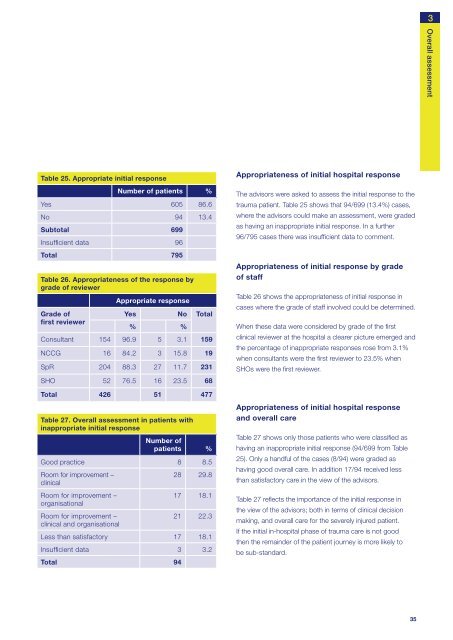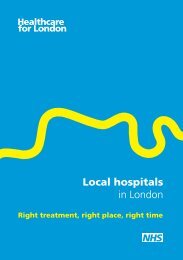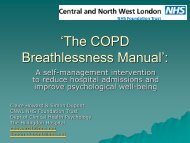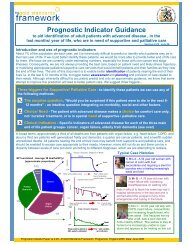NCEPOD: Trauma - Who Cares? - London Health Programmes
NCEPOD: Trauma - Who Cares? - London Health Programmes
NCEPOD: Trauma - Who Cares? - London Health Programmes
You also want an ePaper? Increase the reach of your titles
YUMPU automatically turns print PDFs into web optimized ePapers that Google loves.
3Overall assessmentTable 25. Appropriate initial responseNumber of patients %Yes 605 86.6No 94 13.4Subtotal 699Insuffi cient data 96Total 795Table 26. Appropriateness of the response bygrade of reviewerGrade offirst reviewerAppropriate responseYes No Total% %Consultant 154 96.9 5 3.1 159NCCG 16 84.2 3 15.8 19SpR 204 88.3 27 11.7 231SHO 52 76.5 16 23.5 68Total 426 51 477Table 27. Overall assessment in patients withinappropriate initial responseNumber ofpatients %Good practice 8 8.5Room for improvement –clinicalRoom for improvement –organisationalRoom for improvement –clinical and organisational28 29.817 18.121 22.3Less than satisfactory 17 18.1Insuffi cient data 3 3.2Total 94Appropriateness of initial hospital responseThe advisors were asked to assess the initial response to thetrauma patient. Table 25 shows that 94/699 (13.4%) cases,where the advisors could make an assessment, were gradedas having an inappropriate initial response. In a further96/795 cases there was insuffi cient data to comment.Appropriateness of initial response by gradeof staffTable 26 shows the appropriateness of initial response incases where the grade of staff involved could be determined.When these data were considered by grade of the fi rstclinical reviewer at the hospital a clearer picture emerged andthe percentage of inappropriate responses rose from 3.1%when consultants were the fi rst reviewer to 23.5% whenSHOs were the fi rst reviewer.Appropriateness of initial hospital responseand overall careTable 27 shows only those patients who were classifi ed ashaving an inappropriate initial response (94/699 from Table25). Only a handful of the cases (8/94) were graded ashaving good overall care. In addition 17/94 received lessthan satisfactory care in the view of the advisors.Table 27 refl ects the importance of the initial response inthe view of the advisors; both in terms of clinical decisionmaking, and overall care for the severely injured patient.If the initial in-hospital phase of trauma care is not goodthen the remainder of the patient journey is more likely tobe sub-standard.35
















